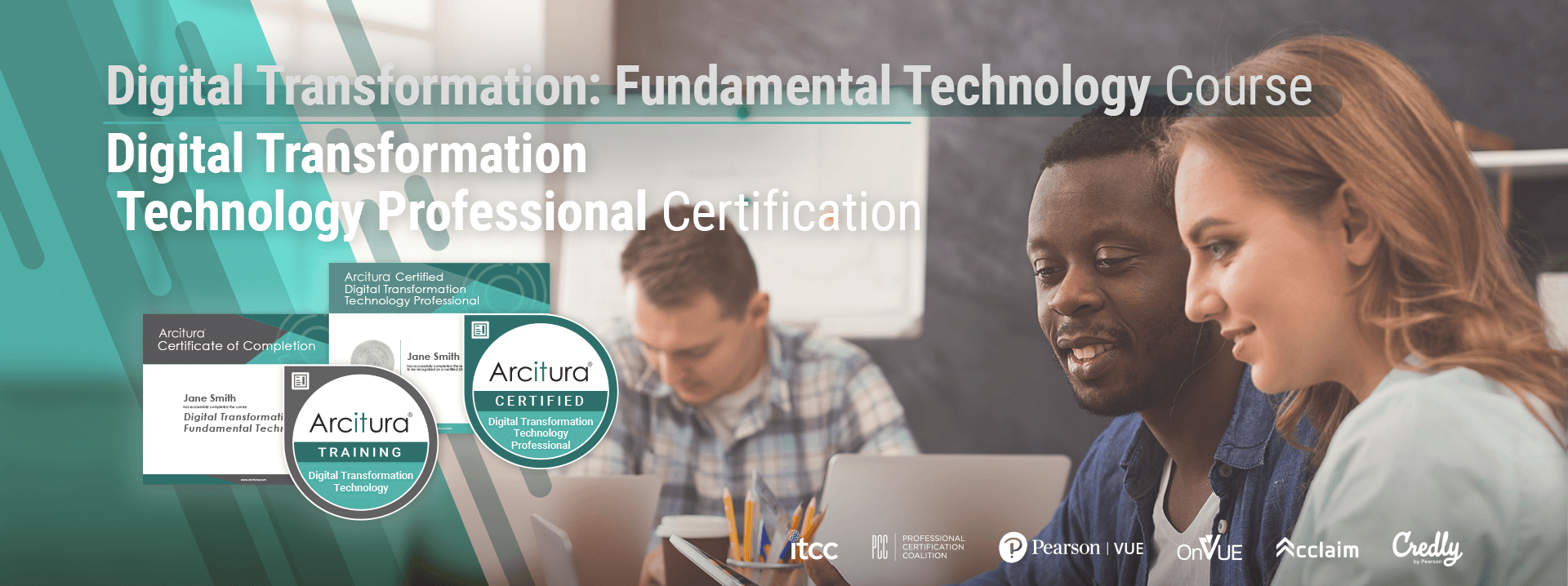
The Digital Transformation: Fundamental Technology course provides essential coverage of digital transformation, as well as primary related digital technologies, including cloud computing, blockchain and IoT. Benefits and challenges of applying these technologies are explained, along with a broad range of fundamental technical details and concepts, as well as explorations of how they can be utilized in business applications.
Complete the Digital Transformation: Fundamental Technology course and, optionally, get accredited as a Certified Digital Transformation Technology Professional by passing the certification exam. You can purchase the course now and get the exam later, or you can get them together at a discount as part of the Certification Bundle.
Upon completing the course you will receive a digital certificate of completion, as well as a digital training badge from Acclaim/Credly. Because this course encompasses both the Digital Transformation Specialist and Digital Transformation Technology Professional certifications, upon passing the exam you will also receive official Digital Transformation Specialist and Digital Transformation Technology Professional digital accreditation certificates and certification badges from Acclaim/Credly, along with an account that can be used to verify your certification status.
If you already completed the Digital Transformation Specialist course modules, you can purchase a partial course (or a partial bundle) with only the modules specific to the Digital Transformation Technology Professional track here.
Choose the Certification Bundle to receive the entire course together with the online-proctored certification exam and a set of practice exam questions, all at a bundle discount.
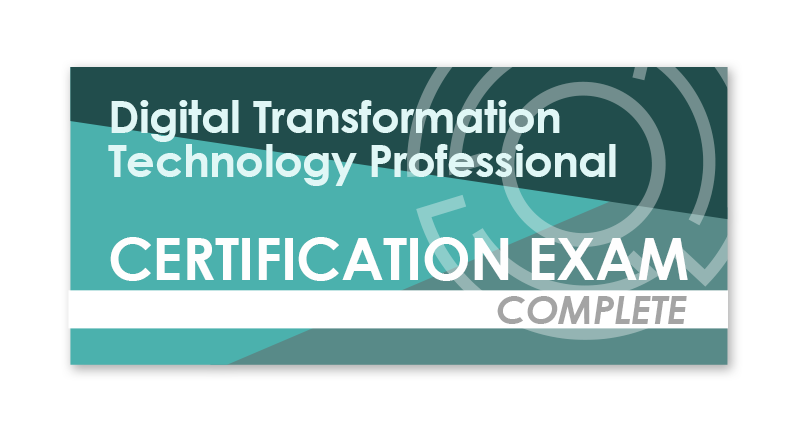
Exam Details

Exam Details
Upon purchasing this course, you will automatically receive access via the Online Interactive eLearning platform. To provide you with the greatest flexibility, you will also have the option to access the course materials via two additional eLearning formats, at no extra cost. All three eLearning formats are briefly described below. A more detailed comparison can be found here.
- For everyday learning: An online interactive eLearning platform with individual lessons, as well as interactive and automatically graded exercises and practice questions.
- For learning on-the-go: A study kit platform with access to full course documents that support online/offline synching, annotations, comments, custom bookmarks and cross-document searches.
- For your reference: A set of printable watermarked PDF documents that you can keep (for all course workbooks and posters).
All three forms of access are subject to Arcitura’s *.
Upon purchase, access to the online interactive eLearning platform (1) is provided within one business day. Access to the study kits (2) and the PDF documents (3) is provided upon request.
The course is comprised of a set of modules. Each module has a set of lessons and is further supplemented with exercises to help reinforce your understanding of key topics. Shown below are the digital contents and the topic outline for each course module:
Module 1: Fundamental Digital Transformation
This course module provides an easy-to-understand introduction to Digital Transformation and how it relates to business, technology, data and people. Coverage includes the benefits, risks and challenges of Digital Transformation, as well as its business and technology drivers.
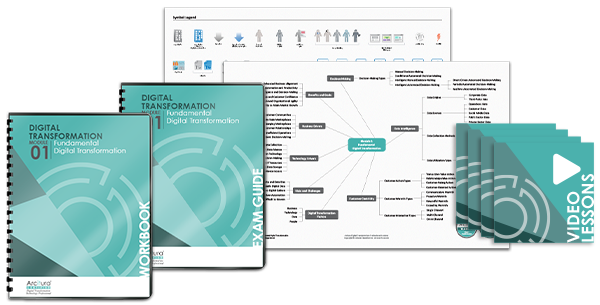
Course Module Contents
Topics Covered
Module 2: Digital Transformation in Practice
This course module delves into Digital Transformation automation environments by exploring the key contemporary technologies used to build Digital Transformation Automation solutions, including AI, RPA, IoT, machine learning, blockchain, cloud computing and big data.
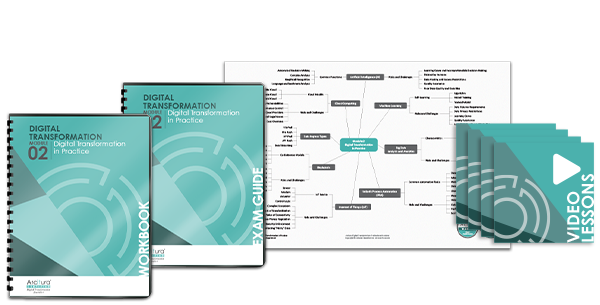
Course Module Contents
Topics Covered
Module 3: Fundamental Cloud Computing
This course module provides end-to-end coverage of fundamental cloud computing topics relevant to Digital Transformation, including an exploration of technology-related topics that pertain to contemporary cloud computing platforms.
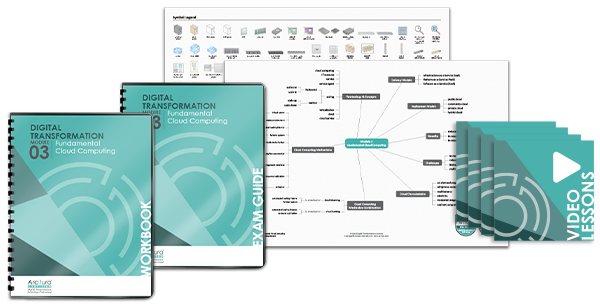
Course Module Contents
Topics Covered
Module 4: Fundamental Blockchain
This course module provides a clear, end-to-end understanding of how blockchain works. It breaks down blockchain technology and architecture in easy-to-understand concepts, terms and building blocks. Industry drivers and impacts of blockchain are explained, followed by plain English descriptions of each primary part of a blockchain system and step-by-step descriptions of how these parts work together.
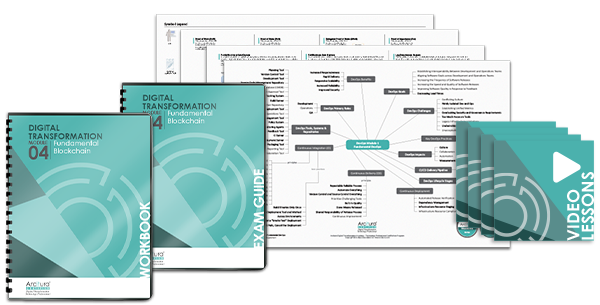
Course Module Contents
Topics Covered
Module 5: Fundamental IoT
This course module covers the essentials of the field of Internet of Things (IoT) from both business and technical aspects. Fundamental IoT use cases, concepts, models and technologies are covered in plain English, along with introductory coverage of IoT architecture and IoT messaging with REST, HTTP and CoAp.
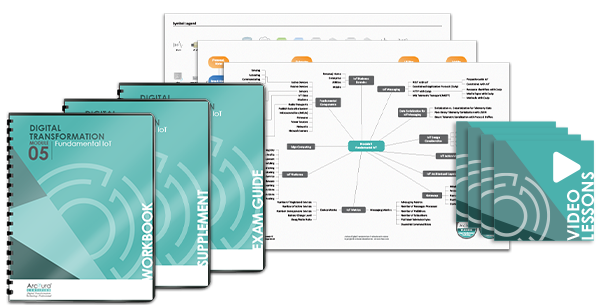
Course Module Contents
Topics Covered
Module 20: Fundamental AI Architecture
This course module provides an essential understanding of AI system and solution architecture. It explains the different AI system architecture types, scopes and modes and provides detailed coverage of core AI system modules (including data ingestion, data preprocessing, feature engineering, inference engine and model repository) and monitors (including operations, data, model and ancillary monitors).
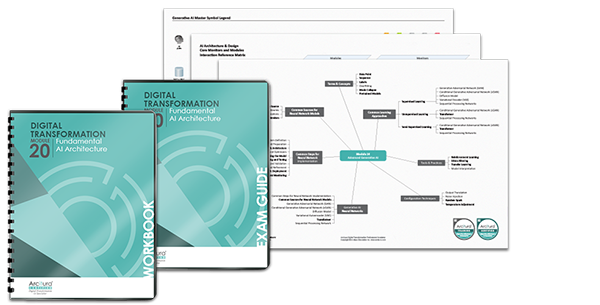
Course Module Contents
Topics Covered
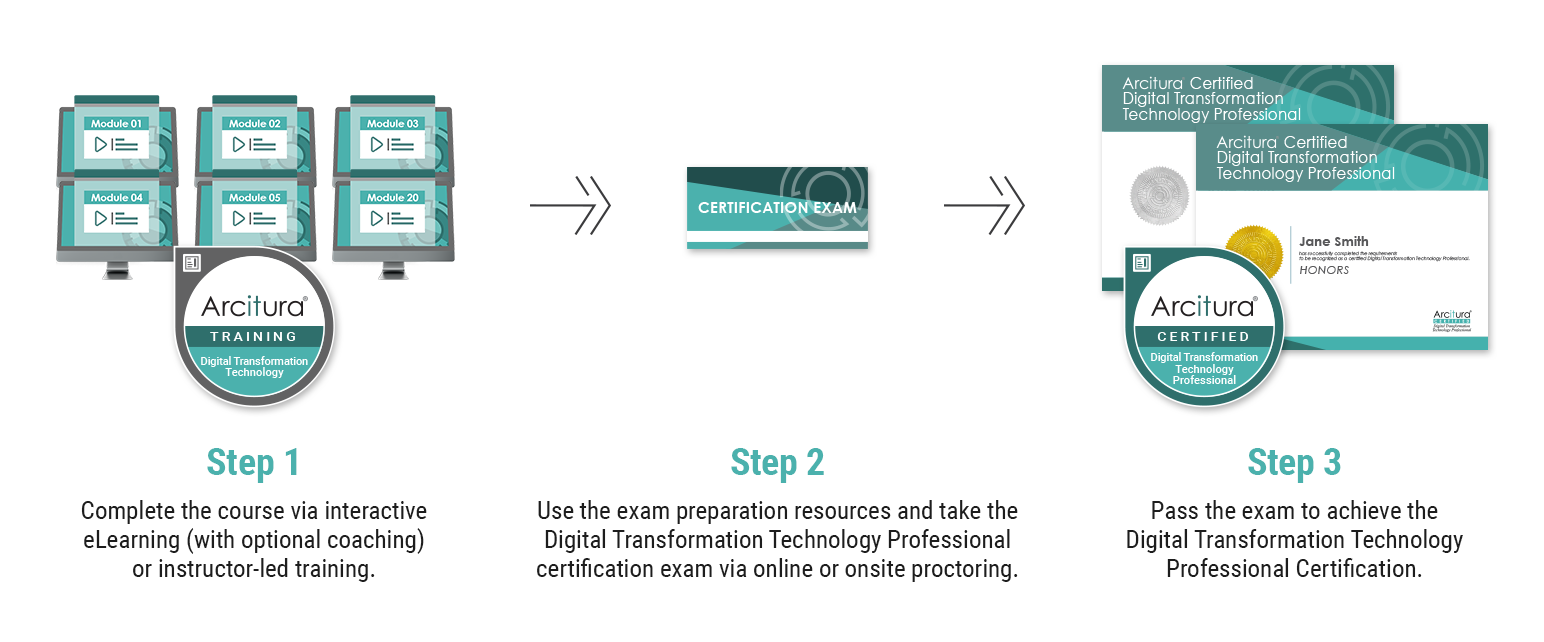
Learn About Arcitura: Take the Video Tour
Watch these helpful informational videos to learn about Arcitura programs, courses and certifications.
About Arcitura
About Arcitura Courses
About Arcitura Certifications
What’s in an Arcitura Course
Comprehensive
Coverage
Each course provides a comprehensive curriculum with 2-3 modules and 20-40 hours of training.
More Than Just
Video Lessons
In addition to standard video lessons, courses include full-color workbooks and reference posters for all
lessons.
Interactive & Graded
Challenges
Courses also include interactive and graded exercises, interactive and graded self-tests and other
supplements.

The Arcitura Difference

EACH COURSE
- is authored by a dedicated courseware development team
- has a self-test, accreditation exam and professional certification
- is available via two different eLearning platforms
ALL COURSES
- undergo a common development process
- are authored to be consistent in quality, structure and style
- share a common vocabulary and symbol notation
- are authored in collaboration with subject matter experts
Take Your Skills Anywhere
Because both courses and accreditations are vendor-neutral, they empower you with skills and credentials that you can take to wherever you need to go.

Lifetime Access Guarantee
Access to the eLearning platforms is dependent on third-party platform providers. As a result, Arcitura cannot make any guarantees or warranties regarding the behavior or availability of the platforms, nor can Arcitura guarantee a specific duration for which these platforms will remain available. When your course is set up on an eLearning platform, your access will have no expiration date and will be provided indefinitely. The PDF documents that can be made available for you to download are yours to keep forever.





